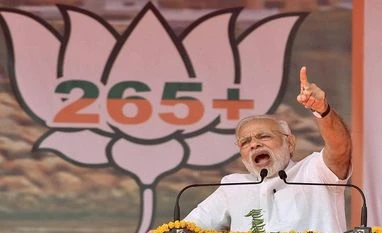The first phase of the over two month-long Samajwadi Party (SP) infighting concluded on Thursday with party chief Mulayam Singh Yadav flagging off his son and current Uttar Pradesh Chief Minister Akhilesh Yadav’s 'Vikas Rath Yatra'. With his younger brother Shivpal by his side, Mulayam Singh settled the succession battle and also showed that the Yadav clan remains united and he continues to be the cementing force.
The second phase, where the party will try to gauge Akhilesh Yadav’s popularity as it prepares for the forthcoming Assembly polls, has begun with the 'rath yatra'. Observers in Lucknow point out that the crowd that greeted Akhilesh along the path of 'rath yatra' cannot be taken as an indicator of the chief minister’s popularity. They argue that his party is in power and has the necessary wherewithal to ensure that a decent enough number of people turn out to hail the 43-year-old leader.
The 'rath yatra', which started on a sour note with the improvised 'rath' getting stalled, would pave the way for the third and final phase of election preparedness. It will help SP leadership ascertain whether it should go it alone in the elections or have a pre-poll alliance with the Congress, and also help it decide the contours of such an alliance. The SP, barring the exception of 1993 Assembly elections, has never indulged in pre-poll alliances and neither has the Bahujan Samaj Party (BSP). This is unlike Nitish Kumar’s Janata Dal (United) and Lalu Prasad’s Rashtriya Janata Dal – both of whom have allied with other political parties in Bihar.
Those supporting an SP-Congress alliance argue how it would ensure that the Muslim votes do not split between SP and BSP. The SP has been the favoured party for the Muslims since 1990. But a strong Bharatiya Janata Party (BJP) might sow confusion in the community’s mind and spur it to gravitate towards the BSP. Party chief Mayawati has reached out to the community in the last few months, but suffers from trust deficit given her party's past dalliances with the BJP.
Meanwhile, the Congress has long term ambitions in Uttar Pradesh and would want to contest on at least a fourth of the seats in the 403-member Assembly. The SP, if at all it agrees to a pre-poll alliance, would be averse to giving that many to the Congress. Therefore, it would need to accommodate smaller players like Ajit Singh’s Rashtriya Lok Dal (RLD).
Any pre-poll arrangement, according to those advocating it in these parties, could look at the 2012 results for a blueprint. In 2012, the SP contested 401 of the 403 seats, won 224 and forfeited deposits on 53 seats. The Congress and Ajit Singh’s RLD had a pre-poll alliance. The Congress contested 355 seats and won 28. It secured a vote share of 11.85 per cent. Its candidates forfeited their deposits in 240 seats. The RLD contested on 46 seats and won nine.
Also Read
Interestingly, both RLD and Congress candidates were runners up in several of the seats in Western UP where either the BJP or BSP won. Western UP has also traditionally not been a strong region for the SP. A Congress-SP-RLD alliance, therefore, might not be as difficult to reach as some think.
Those in the SP and Congress who are supportive of the alliance argue that the Congress could be promised a larger share of seats in any poll arrangement that the two parties reach a couple of years hence for the 2019 Lok Sabha polls. This, however, would be anathema to Mulayam Singh who nurses ambitions of playing a larger role in national politics. It is still a peeve with him that it was UP where the BJP lost the 2004 elections, with SP winning as many as 35 of the 80 seats but couldn't get a share in the Congress-led UPA government.
Some have even suggested that Ajit Singh's son Jayant Chaudhary could be named the Deputy CM candidate to enthuse the Jat voters, which have gravitated towards the BJP. "It would also help achieve the eventual ambition of bringing the old Lok Dal-Janata Dal unity," a source said.
The Congress is also being asked to play a role similar to the one it played in Bihar in 2015. Congress Vice-President Rahul Gandhi had played a key role in ensuring a Nitish Kumar-Lalu Yadav alliance and had been willing to sacrifice Congress' share of seats in the alliance. In Bihar, the Congress contested on 41 of the 243 seats in alliance with JD (U) and Lalu Prasad-led Rashtriya Janata Dal. Its strike rate was the best among all the parties, winning 27 of the 41 seats, or nearly 66 per cent.
The next one month would show whether the SP and Congress would be able to subsume their ambitions.
)